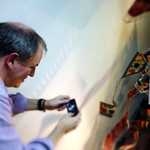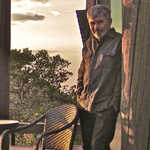There’s a line in Brideshead Revisited that I was excited to use here, but when I saw the whole quote I blanched and decided against it, for fear of misrepresenting the subject of this sketch.
But hi.co is going away soon, and I need to get this one committed to the overall work, and I have every confidence the reader will bear with me for the full context. Perhaps it’s best to say that I consider the subject of this sketch, the mustachioed and wild-eyebrowed gentleman above, to be one of the most glorious and beautiful creatures I’ve ever known.
I should like to bury something precious in every place where I’ve been happy and then, when I was old and ugly and miserable, I could come back and dig it up and remember.
The not-ugly, not-miserable man in the photo is B.J. Stiles: hero of the civil rights era, hero of the early 1970’s social justice movement, hero of the early AIDS epidemic. And for this author, most personally: my hero. I’ve marveled at him, aspired to emulate him, and perhaps the greatest compliment one can pay in our forever-multitaking attention-deficit Western mindset: when he speaks from the heart I have to stop everything I’m doing and examine every single word he says. He never fails to surprise me, and he knows me better than I might ever know myself.
Many’s the time I’ve found myself in deep holes of depression, confusion, and self doubt. During those times he’s always there, either to toss me a shovel to dig myself out, or a rope so he can pull me back to the surface.
But there’s mystery in that word, “always.” He turned 83 this year. Granted, he goes to the gym six days per week, everyone assumes he’s in his 60’s, and the going wisdom these days is, “60 is the new 40.” Nonetheless, he won’t last forever. I won’t last forever. We won’t always be here.
If you were to play the odds you’d probably put your money on B.J. shaking off his mortal coil before I do, myself having been born in 1968 and he being born in 1933. But you’d have hedged that bet six years ago when doctors found an aggressive bone tumor in my jaw. B.J. put his life in San Francisco on hold and came to Washington, D.C., for several months to guide me through the long arc of diagnosis and surgery and recovery.
One night, having been sent home from the hospital, I stopped breathing.
This was not a peaceful, go-limp experience; this was torturous pain, abject panic, life-flashing-before-my-eyes terror.
I had been lying flat on my back. The sutures along the left side of my jaw and around the right side of my chest, where my surgeons had removed a rib to serve as a bone graft, made it impossible to sleep in any other position. The graft came from the right side, according to Dr. Ross, so for the rest of my life when I’m struck with the leftover pain of being ribless I won’t confuse it with the similar left-side pains symptomatic of heart attack.
That night the thoracic nerve endings leaped back into action, having been numbed since surgery by morphine and oxycodone. My position and the freshly awakened neurons combined to produce scale-10 pain that was so violent, so all-consuming that it overrode my natural instinct to breathe. Even the tiniest attempt to inhale ripped my body in half. Adrenaline and survival instinct prompted my arms and legs to thrash, compounding the pain even further. I was asphyxiating.
A pair of arms slid beneath my back and my knees. The arms hoisted me out of bed and onto my feet. My lungs shifted, and my body snapped into a semi-stooped posture that allowed me to breathe again. Strong hands held my shoulders, steadying me while staying clear of my wounds. Panic receded and silence returned to my body. I am 6-foot-5 and at the time I weighed 180 pounds. B.J. was 77, and performed a feat of physical strength that still amazes me.
He’s not at all comfortable with this story. He objects when I say he saved my life. Yet if not for him that night in 2010 I very likely wouldn’t be here.
At the top of this sketch is a photo of him in 2013 at the home of his eldest daughter. When I snapped the photo we’d seen each other through my illness, as well as a process of serious illness that he experienced just around the time I had stabilized and considered things “back to normal.” For the record – and stated more briefly than it deserves – it’s terrible to have a grave diagnosis delivered to you about yourself, but in my experience it’s far, far worse to have one delivered to someone you dearly love.
In 2013 we took a victory tour. We had each survived our journeys with disease and needed to reconnect with those we adored. Awe and joy infused every moment. We weren’t supposed to be there. One or the other, maybe, but certainly we weren’t both supposed to survive. And yet.
In that awe- and joy-infused moment, in a relatively common pastoral setting of blue sky and green trees, the Brideshead quote came to mind. We bury treasure as we go. We keep a map in our heart.
In time, one of us will be gone. Then both of us will be gone. Our treasure will remain where we left it.
Thank you hi.co for being steward and custodian of this community’s treasures. We are forever grateful.







